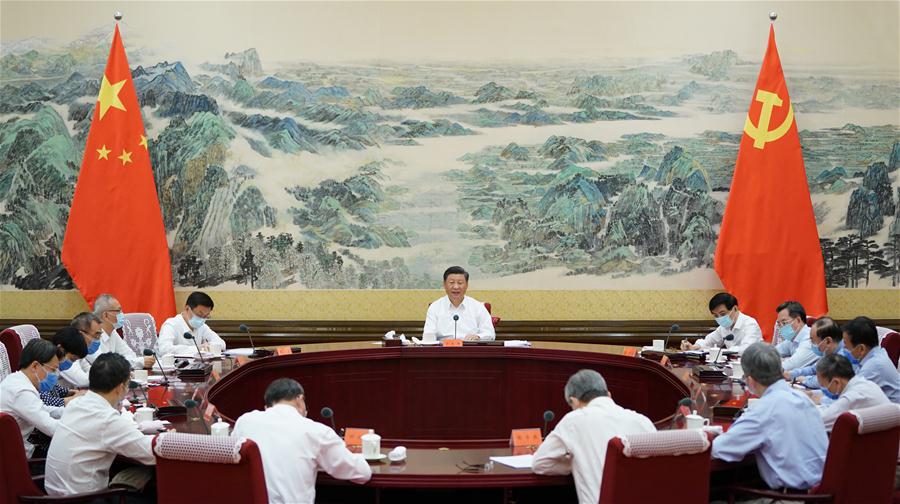Understanding the CPC's domestic and global goals via Xi's book
By Ehizuelen Michael Mitchell Omoruyi | chinadaily.com.cn | Updated: 2020-09-01 09:50

The recently-published third volume of President Xi Jinping's The Governance of China contains interesting chapters that went a long way to enlighten us on how the Communist Party of China views its role in China and the world. Published on June 30 in Chinese and English, the volume collects 92 articles, including numerous speeches from Xi, which involves numerous popular and touching stories, conversations, instructions and congratulatory letters.
The volume also contains 41 photos of Xi Jinping, which include him riding a bicycle with his daughter, pushing his mother around in a wheelchair and casually chatting with farmers. These vivid and touching stories show Xi's unique charm of wisdom, humor, modesty and kindness.
For a better understanding of CPC domestic goals, the book made us understand that the CPC has functioned in a competitive environment right from the day of inception in July 1921.
It is worth noting that indirectly, social, political and economic advancement among the "Asian Tigers" nations, such as Singapore and South Korea, put competitive pressure on the CPC, for the reason that the ruling parties in these Asian nations offered faster economic expansion and improved the standard of living for their citizens. Like any other political party globally, the CPC needs to win its citizens' support by improving their livelihoods as well.
In the process of winning its citizens' backing, the CPC has evolved into a competent manager of China's great transformation from underdeveloped society with enormous poverty into a modern society with remarkable economic expansion and greater social, political and economic freedom.
What the CPC has been doing for the past nine decades can be divided into two classifications – working on reform and acting as a substitute for its citizens to combat the various crisis. These policies reflect a remarkable determination to combat crisis and continue on the path of structural reform, in spite of strong headwinds from the deteriorating external environment and domestic structural adjustments.
With that said, as for working on reform, the CPC has been working tirelessly and constantly for decades on reform, which includes the replacement of the commune system by the family farming system, the permission to transfer land-use rights that led to booming commercial and residential property markets, and the hard push to improve the quality and efficiency of development. This also includes the creation of firms and other laws and regulations governing commerce and finance in the nation, and building on continued efforts to sustain development by devoting more time to addressing development imbalances and inadequacies.
These reforms are essential and relevant in the daily life of ordinary people. Therefore, through this reform process, the CPC has been able to harness the rewards of globalization with approximately two-thirds of the nation's GDP coming from the non-State sector with little government intervention, as well as lifting millions of its citizens out of poverty in the past four decades. With this remarkable effort, the CPC has reimagined itself as a driver of change, guiding the nation's path to wealth creation.
In combating the crisis, the CPC acts as a substitute for institutions that are not yet mature enough. The CPC has positioned itself to maintain judicial independence, manage macro (global) meso (national) and micro (project) economic policies and national assets, provisions of a social safety net, handle natural disasters, and manage national security in this category, as well. That means good governance is the "master key" to solving all problems in a nation. No wonder there is less drama and more prosperity for the Chinese people.
As an experienced crisis-combating organization, the CPC is very sensitive to any political, social and economic menace that the nation faces and the organization is always willing to address them accordingly.
The book made us understand that via Chinese leadership, the government is devoted to building governance capacity and preventing any menace that may befall the nation, and that the government is eager to learn from other nations' experiences to shape every economic, diplomatic, military and social policy.
This learning process – characterized by experimentation, assessment and adjustment – emerged from the CPC military experience of the 1930s, and was applied by Deng Xiaoping in his reform and opening- up policy in the 1980s, and has been refined by subsequent Chinese leaders.
This reveals how the five generations of Chinese leaders rooted their thinking, actions and policy in the area of governance in Chinese values and rooted their values in their various foreign policies, revealing that making headway economically is not possible without a sound and complete governing mechanism. No wonder the CPC has become less ideological and more pragmatic than parties in developed democratic nations like European nations and the United States.
Based on this reality, it has performed better, especially in times of crisis like the novel coronavirus. Today, Beijing has removed the requirement for their citizens to wear masks outdoors, further relaxing rules aimed at preventing the spread of COVID-19 after the city reported 13 consecutive days without new cases.
In his speech at the 2017 Party Congress, President Xi Jinping encouraged the Party "to work hard to protect the nation's security, sovereignty and development interests, and strongly oppose all efforts to divide the nation or undermine China's ethnic unity, stability and social harmony."
Xi Jinping is a promoter of equality. He believes that "all nations, big or small, strong or weak, wealthy or poor, must treat each other equally and build a stronger community where we thrive together.
"So, we need to assist each other in solidarity to attain sound development as we work to ensure our own development. The world will be a better place only when everyone is better off." China's development poses no threats to others and China's "national rejuvenation" will only expand the convergence of interests with other nations.
By this reality, the third volume highlights Xi Jinping's extensive vision, deep knowledge and sound wisdom in running the nation's affairs, as well as his accurate understanding of worldwide politics and the relations between China and other nations. In short, China's government seems to have a clear long-term vision for its nation.
For a better understanding of CPC global goals, China has been involved in conflict prevention, post-conflict reconstruction, and peace building by upholding the principle of noninterference, committing extensively to the United Nations' peacekeeping and supporting the African Union. In a changing geopolitical security environment, established and emerging powers alike have to be duty-bound to develop frameworks for collaboration that can mitigate tensions linked to novel power dynamics.
By enabling this, the world can collectively foster the successful integration of emerging powers in the management of post-conflict and transitional settings and the prevention of future violence.
With that said, China also supports worldwide institutions and pacts, such as the World Health Organization during COVID-19 and other global health crises, the World Bank and the Paris Agreement on climate change of which China has lived up to its commitment.
Furthermore, since the early 2000s, China's foreign policy has centered on peaceful development, meaning the emergence of China in the new politics of reconstruction does not represent any threat as it has been portrayed by some.
Under the Belt and Road Initiative, Chinese firms are actively involved in various infrastructure projects, such as transport and commercial networks connecting Asia, Africa, Europe and beyond. For Africa, Chinese investment on the continent has notably surged since the launch of the initiative, which has positive reflections on the economic cooperation between African nations and China.
Beijing also has courted its neighbors and sought to build new partnerships. China has been a driving force behind the creation of institutions to support other nations in the region and beyond: The Asian Infrastructure Investment Bank and the New Development Bank (previously known as the BRICS Development Bank).
As such, President Xi Jinping, through his numerous elaborations in his book, showcases the position of China as a responsible nation that would shoulder more responsibility in China and the world. Based on my understanding of the book, I would like to say that good governance should be seen as our heart. When the heart stops beating, there is nothing but a dead nation.
In conclusion, if there is one thing African governments can learn from reading this book it is this: the road to sustainable and stable governance framework is long and arduous. Setbacks are possible and even likely. But they should know that with the help of a concerned government that is accountable to the people, they will be able to move in the right direction and attain sustainable governance that is stipulated by the 2030 Agenda for Sustainable Development and the African Union Agenda 2063 aims of the "African we want".
The author is executive director of the Center for Nigerian Studies at the Institute of African Studies, Zhejiang Normal University.
The opinions expressed here are those of the writer and do not necessarily represent the views of China Daily and China Daily website.
























